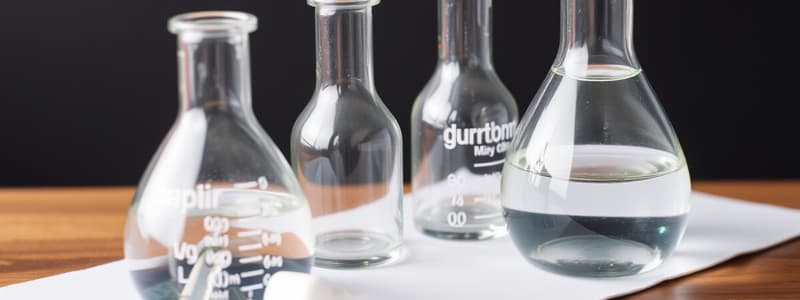Podcast
Questions and Answers
What is a physical property?
What is a physical property?
- A property that changes the substance
- A property that cannot be observed directly
- A property that can be seen or measured without changing the substance (correct)
- A property only applicable to liquids
What are some examples of physical properties?
What are some examples of physical properties?
Color, shape, texture, luster, mass, weight, volume, density, state, flexibility, magnetism, conductivity, malleability, ductility, solubility.
What does flexibility mean?
What does flexibility mean?
The ability to be stretched or bent.
What does magnetism refer to?
What does magnetism refer to?
What is conductivity?
What is conductivity?
What does malleability mean?
What does malleability mean?
What is ductility?
What is ductility?
What does solubility mean?
What does solubility mean?
What is a chemical property?
What is a chemical property?
What are some examples of chemical properties?
What are some examples of chemical properties?
What is rust?
What is rust?
What does flammability refer to?
What does flammability refer to?
What is reactivity?
What is reactivity?
What is a physical change?
What is a physical change?
What is a chemical change?
What is a chemical change?
What kind of change is the souring of milk?
What kind of change is the souring of milk?
What kind of change is shredding cheese?
What kind of change is shredding cheese?
What kind of change happens when iron rusts?
What kind of change happens when iron rusts?
What kind of change is wood burning?
What kind of change is wood burning?
What kind of change is crushing a piece of bread?
What kind of change is crushing a piece of bread?
What kind of change is eating food?
What kind of change is eating food?
Flashcards are hidden until you start studying
Study Notes
Physical Properties and Changes
- A Physical Property is observable or measurable without altering the substance's identity.
- Key Physical Properties include color, shape, texture, luster, mass, weight, volume, density, state, flexibility, magnetism, conductivity, malleability, ductility, and solubility.
Specific Physical Properties
- Flexibility refers to the ability of a material to be stretched or bent.
- Magnetism involves the capability to attract metallic objects.
- Conductivity is the measure of a substance's ability to transmit electricity.
- Malleability describes a material's ability to be deformed under compression, such as being hammered into shape.
- Ductility is the ability of a substance to be stretched into wires without breaking.
- Solubility is the capacity of a substance to dissolve in water.
Chemical Properties and Changes
- A Chemical Property indicates how a substance can change to form new substances through a reaction.
- Common Chemical Properties include rust formation, flammability, and reactivity.
Specific Chemical Properties
- Rust occurs when iron reacts with oxygen, resulting in a new compound.
- Flammability signifies a material’s ability to catch fire and burn.
- Reactivity is the ability of two substances to interact and form new chemical products.
Types of Changes
- Physical Change: An alteration where the substance's appearance changes without transforming into a different substance.
- Chemical Change: A transformation resulting in the formation of one or more new substances with different properties.
Examples of Changes
- Souring of milk is classified as a Chemical Change.
- Shredding cheese exemplifies a Physical Change.
- Iron rusting represents a Chemical Change.
- Wood burning is also a Chemical Change.
- Crushing bread is an example of a Physical Change.
- Eating food involves both types of change: Physical Change during chewing and Chemical Change during digestion.
Studying That Suits You
Use AI to generate personalized quizzes and flashcards to suit your learning preferences.




